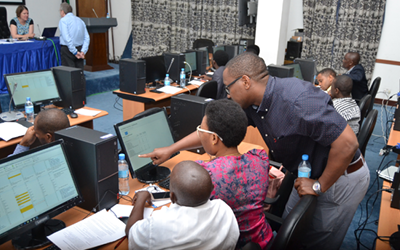Research Brief
The impact of tax-benefit systems in Africa
Social protection systems in Africa are still in their infancy. As countries develop their systems, it is crucial to look at how existing tax-benefit programmes affect poverty and inequality and how countries can learn from each other’s systems.
Microsimulation models can be used to study existing tax-benefit systems and look at how one country’s system would work if applied to the population of another
Exporting the South African tax-benefit system to other African countries would reduce inequality. Income poverty would be decreased by 2.2 percentage points in Mozambique and by up to 17.8 percentage points in Tanzania
Applying the less redistributive Mozambican policies to South Africa would lead to greater inequality and increase poverty by 22 percentage points.
In Africa, many countries are expanding taxation to finance increased public spending and to scale up social programmes. Microsimulation models provide us with a great way to study the expected outcomes of different policy options. Relying on national surveys — which provide information on household market income and demographic and employment status — the models can calculate taxes and contributions paid by formal sector workers as well as the benefits received by eligible households.
Testing alternative scenarios
Microsimulation models can simulate both existing tax-benefit systems and potential alternatives. They make it possible to run simulations where the whole of one country’s is applied to the population of another. This offers us a way to assess the redistributive impact of each national tax system in comparison with the others.
 The SOUTHMOD project has developed microsimulation models for six African countries: Ghana, Zambia, Mozambique, Tanzania, Ethiopia, and South Africa. To assess the role of tax-benefit systems in explaining differences in inequality and poverty we looked at what effect applying the most redistributive system (South Africa) to the five other countries would have. Despite South Africa being one of the most unequal countries in the world, its redistributive system is slightly more developed than in the other African countries considered here.
The SOUTHMOD project has developed microsimulation models for six African countries: Ghana, Zambia, Mozambique, Tanzania, Ethiopia, and South Africa. To assess the role of tax-benefit systems in explaining differences in inequality and poverty we looked at what effect applying the most redistributive system (South Africa) to the five other countries would have. Despite South Africa being one of the most unequal countries in the world, its redistributive system is slightly more developed than in the other African countries considered here.
To study an alternative scenario, one of the least redistributive systems (Mozambique) is applied to the other populations.
The South African system can reduce inequality and poverty
The results confirm that the current tax-benefit systems in Ghana, Zambia, Mozambique, Tanzania and Ethiopia have smaller redistributive power than the South African system. Part of the inequality gap between South Africa and the other countries — and, to a lesser extent, part of the poverty gap — could be eliminated by exporting the South African system to these countries.
 If the South African system were exported, the reduction in inequality as measured by the Gini coefficient would range from 3.3 points in Ghana to 19.3 points in Ethiopia. Income poverty would be decreased by 2.2 percentage points in Mozambique and by up to 17.8 percentage points in Tanzania. These effects are due the relatively more generous social benefits offered in South Africa and, in the case of inequality, partly due to South African tax progressivity.
If the South African system were exported, the reduction in inequality as measured by the Gini coefficient would range from 3.3 points in Ghana to 19.3 points in Ethiopia. Income poverty would be decreased by 2.2 percentage points in Mozambique and by up to 17.8 percentage points in Tanzania. These effects are due the relatively more generous social benefits offered in South Africa and, in the case of inequality, partly due to South African tax progressivity.
Looking at the reverse scenario, applying Mozambican policies in South Africa would increase the Gini by more than 9 points and increase poverty by 22 percentage points. These effects are essentially due to the weakness of Mozambican social benefit system compared to that in South Africa.
Learning from others
Adopting more redistributive social benefit schemes and progressive tax systems has great potential to reduce both income inequality and poverty
Extra funds will be needed for countries to achieve a higher level of redistribution
The exercise described above provides an opportunity for different countries to learn from each other to improve social protection and reduce inequality. It turns out that a lot of the differences in levels of inequality, and to some extent poverty, across countries are due to policy choices. Adopting more redistributive social benefit schemes and progressive tax systems has great potential to reduce both income inequality and poverty. Major reforms do not come without cost, therefore extra funds would be needed for these countries to achieve this level of redistribution.
 Join the network
Join the network